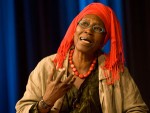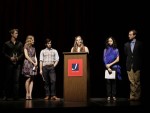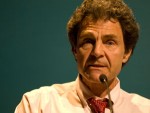Title
The annual schoolwide convocation each September affords an opportunity to hear about some unusual projects that enterprising Juilliard students have participated in over the summer. One presentation this year was made by a six-student delegation that attended the National Performing Arts Convention in Denver in June, held every four years to promote exchange and consensus in re-examining and shaping goals for professionals in the field. The idea for the students’ participation came from Stephen Pier, artistic director of Juilliard’s Mentoring program, and Eric Booth, a Mentoring program advisor and a guiding force behind the convention. The six-member team was selected after all students had participated in two town hall meetings and created an online survey to clarify their ideas and concerns about the future of the performing arts. The student team joined Bärli Nugent, Mentoring’s executive director, and jazz faculty member Gregory Knowles for the four-day convention, serving as full participants and trained facilitators for the daily caucuses. The Juilliard Journal reprints their convocation presentation in its entirety here, for the inspiration of all.
Senegalese dancer and choreographer Germaine Acogny spoke at the session titled “Radical Ideas From Beyond Our Borders."
(Photo by © Glenn Ross/National Performing Arts Convention.)The six students who attended the National Performing Arts Conference are (left to right) Evan Todd, Alli Job, Zach Winokur, Megan Griffin, Salima Barday and Evan Fein; they spoke about their experiences at convocation on September 3.
(Photo by Peter Schaaf)Eric Booth, who was involved in designing and planning the conference, spoke about the power of community-building at one session.
(Photo by © Glenn Ross/National Performing Arts Convention.)Body

My name is Megan, and these are my friends Zack, Evan, Salima, Evan, and Alli. As representatives from all divisions of Juilliard, we traveled to Denver, Colo., with faculty and staff advisors Bärli Nugent and Greg Knowles to participate in the 2008 National Performing Arts Convention. The trip began with Eric Booth in the Mentoring program, where students are paired with faculty from different departments to broaden their artistic experience at Juilliard. The convention was the Mentoring program on a global scale: it took us outside the walls of Juilliard. With Eric Booth’s advice of “Be unusually friendly,” we attended seminars and roundtable discussions, and met with artists and administrators. The purpose? To come up with practical and exciting actions to take so that artists everywhere can create the future we want for the performing arts on a local, national, and global scale. At this unprecedented event, 4,000 people representing artistic organizations from around the world came together to discuss the future of the arts. We were the only student delegation present.
Megan Griffin, Third-Year Bachelor’s Student in Viola
Following the four-day caucus, nearly 4,000 peopled filled the Denver Convention Center to vote on actions that could be taken on an individual, local, and national level to address three major issues facing the arts in our nation:
1. Lack of advocacy for the arts
2. Lack of arts education
3. Lack of diversity in the arts community and its audience
A few of the actions decided upon to increase advocacy for the arts included organizing a national media campaign with celebrity spokespersons and a unified message, as well as demanding an arts policy platform from all political candidates—which I would like to add, that of all the presidential candidates, only one incorporated an arts platform into his campaign, and that is Senator Barack Obama.
To work towards the restoration of arts education in America we need to lobby for education reform, including rescinding No Child Left Behind, which has been a major factor in the diminishing arts programs within our public schools, as there is no real way to quantify or test the intrinsic value of the arts. We must also begin integrating arts teaching in educators’ professional development as well as integrating teaching programs in artist organizations.
If we are to begin diversifying our arts communities and audience base, we need to open an honest dialogue across community groups to share priorities and identify barriers to participation, expand beyond traditional venues to establish new points of access, and discover arts in our community offered by cultures other our own so that we can establish peer relationships.
Evan Todd, Second-Year Drama Student
I’m going to go off script for a moment to relay a story. Many of you have probably heard of El Sistema, but for those of you who haven’t, it is a program of social reform through music which has revolutionized the country of Venezuela over the past several decades. Right now in Venezuela, there are more young people in state-funded orchestras and choruses than in soccer. The man who conceived and implemented El Sistema is José Antonio Abreu, and he was present at the convention to deliver an address. After his speech, Alli Job and I, in an effort to be “unusually friendly,” thought it would be a good idea to go backstage to offer our support. The conversation went something like this:
Me: Hello, maestro, we are students from The Juilliard School and we just wanted to say how much we support and admire your work.
Abreu: (pause) Juilliard? I would like to invite you to Caracas to see the farewell performance of Gustavo Dudamel. You will organize a collaboration between my orchestra and your school.
Me: Um, we’re not exactly the people you should be talking to, but we’d be happy to put you ...
Abreu: No. You are exactly the people I need to talk to, and you will make this happen.
After that, he snapped his fingers and a man in a suit named Carlos came over to take down our information. Unsure of what had just happened and of what was to be done, we thought it best to call Bärli Nugent. I decided to run outside and call her immediately. Now, I don’t know if it was excitement or the fact that lately around Juilliard there have been so few walls, but what I attempted to walk through was not a door. It was, in fact, a wall of glass. I face-planted myself into it at full force, fell backwards, and left Alli with the unfortunate task of picking me and my phone up and calling Bärli while I nursed my bruised pride.
We are developing our options for this program and plan to meet again with Maestro Abreu when the Simón Bolivar Orchestra travels to New York in March.
Now, back to the script! At the core of N.P.A.C. was the goal of identifying challenges to the performing arts community and developing strategies that would allow us as artists to practically address those challenges over the next 10 years.
In order to generate these ideas, all delegates to N.P.A.C. participated in daily roundtable discussions. We were divided randomly into groups of 10, given the same topic to discuss, and were expected to produce a brief written report. After each session, the reports were analyzed and the collective results became the next day’s topic for discussion.
As the only students at the convention, we knew we would be attracting a lot of attention, and we felt that it would be important to maintain as visible a role in the proceedings as possible. Therefore, we all volunteered to act as table-facilitators. During the daily caucus, it was our job to lead a conversation that was thoughtful, concise, and polite. This was sometimes difficult, especially when we found ourselves at a table full of high-power artistic executives 30 or 40 years our elders, but it was also one of the most rewarding parts of the convention.
It was wonderful to be able to see a choral director from Colorado Springs, an elementary-school music teacher from Nashville, a choreographer from Miami, an actor from Montana, and the president of Opera America all sit down together and talk as equals, and it was incredible to notice that at all levels and in all regions, artists are faced with the same challenges.
At Juilliard, we are in the unique position of being in a place where these sorts of discussions happen every day. It is important that we take advantage of the opportunity to its fullest, because a vital arts community starts here.
Evan Fein, Second-Year Master’s Student in Composition
Our role at N.P.A.C. was a curious one. We were to express the voice of the new generation and bring things back here. At the same time, we were a minority because of our age (in fact, people under 21—really just us—represented .0015 percent of the 4,000 people there), we were a minority because we are artists, and because we are students.
The crucial thing to bring back to Juilliard from the convention is a greater understanding of the contemporary climate of the performing arts … and to assess, as a school, where we are situated (relative to countless other institutions, trends, concepts, etc.) inside the wider performing-arts zeitgeist. Isn’t this what Juilliard most prides itself on—a constant reassessment, reinvention, reflection on the curriculum and spirit of the School and the way it’s educating its students, so as to be perpetually aligned (or at least knowledgeable) about where the School sits in a larger context? I don’t think there was a better opportunity to tangibly confront these issues, or a more unique opportunity to establish Juilliard in a new way and forge relationships with other institutions so as to powerfully engender cross- or interdisciplinary collaborations with new institutions and people, which was one of the main themes of this year’s convention.
I can’t think of a more fertile ground for artistic development than Juilliard, with its density of talent and resources. These are things that should be shared with other institutions, and I think other institutions might help us rethink our approach to exploiting the interdisciplinary potential here. It is in that work that profound learning occurs! Juilliard, being a pre-eminent performing-arts conservatory, has enormous potential to make progressive change from the top. N.P.A.C. represented an important practice that should be continued, of bringing our experiences from this institution and laying them bare in a diverse forum. It should be easier to do this now, to get out, since there are no walls (literally) keeping us in right now. (March towards—and through—the glass.)
Zack Winokur, Second-Year Dance Student
So what did we get out of this experience?
We immediately saw a connection to Dr. Polisi’s book called The Artist As Citizen, which talks about how to act as citizens in today’s society. At the convention, we experienced, first-hand, the importance of knowing how to be effective communicators, as we listened to artists such as José Abreu, the founder of El Sistema, and Germaine Acogny, a well-known dancer and choreographer.
Dr. Polisi’s idea that you must be a well-informed citizen to be an artist truly came into play for us. At the international cultural diplomacy session, Carolinda Dickey, the co-director of an international forum for dance companies called the International Tanzmesse in Germany, said, “The best way to ignore the U.S.A. in a cultural conversation is to convene a meeting of every nation’s minister of culture.” She acknowledged that, as Americans, we are not even sitting at the table of international conversations, because we do not have a representative for these matters. This showed us how far behind we are as Americans, and it is up to us to make a difference.
We also met fellow citizens who decided to become involved in arts advocacy on a local level, using their community’s available resources to make a difference in any way possible. We saw a wide range of projects as local as starting a choir in a remote city in Kansas to fostering closer international ties for performances across seas. No matter how big or small, we saw the importance in every effort to spread the joys of art by being our own advocates.
Salima Barday, B.M. 2008 in Double Bass
So now the question is: What next in the future of the arts and the artistic community? What can we do? I can only help but see all of these questions as opportunities. …
We are in many ways being given an invitation to change our world right now, not only for ourselves but also for the arts. We have a commitment not just to be artists but also to be ambassadors for the arts. And at this crucial crossroads in our political environment we have an obligation to be educated in our rights as artists as well as individuals and vote in the upcoming presidential election.
While in Denver we attended a seminar called “The Future of Arts Leadership,” and being there as the only six students out of 4,000 people I truly understood the obligation we, the Juilliard community, have as the future of the arts leadership. We need to challenge the role of the arts in our country and in our individual communities, and to take this opportunity to defy the idea of arts being secondary and worth cutting in public schools. We must call for a shift in social values and start building a dialogue by sharing our passion for the arts. By each of us starting a discourse, we have the ability to become a unified voice that can break generational barriers, create social diplomacy, and demand a national infrastructure for the arts. This is a time when we have the occasion to acknowledge history but have the obligation to look into the future and have direct contact with change. We are in an environment here at Juilliard that is truly on the forefront of involvement in the arts; we are surrounded by faculty that are supportive and challenge us to truly be a citizen as well as an artist. We as students need to take advantage of this rare and exceptional environment in more ways than just being a traditional student; we need to do this by taking advantage of the many programs such as the Mentoring program, the Speaking Up series, the many opportunities through the Office of Educational Outreach. We can let our voices be heard not only within the walls of Juilliard, but more importantly, outside the walls of Juilliard. We have an environment here at school where a group like ARTreach, a student-run organization, has the support and tools necessary to travel to more than four continents and work with thousands of children all over the world, teaching them empowerment through the arts; and this is just another reminder of what a special environment this school is.
In closing, Juilliard’s involvement in the National Performing Arts Convention was a reminder of the commitment we all must make to pursue our passion for the arts and to constantly challenge ourselves to be more than just a musician, a dancer, or an actor, but to also be an ambassador.
Alli Job, Fourth-Year Bachelor’s Student in Double Bass







